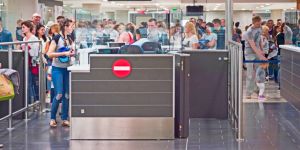
As Cyprus is one of the safest countries in the world, you shouldn't have any worries about raising your kids here. Cypriots are very friendly in general, particularly towards children you won't find many restaurants that won't go out of their way to make your kid feel welcome. Throughout the island, there are many kindergartens, both public and private for your consideration, many of which English or Russian speaking. You can also opt for a nanny or a childminder.
Public childcare in Cyprus
Children in Cyprus go to preschool around five. As maternity leave in Cyprus is only 18 weeks, and there is no paid paternal/parental leave, it will be essential for you to find the right kindergarten for your child as soon as possible if you plan on going back to work. Cyprus has many excellent public kindergartens, but the main thing you should be aware of is that the teachers there will speak Greek (Greek, after all, is the official language in Cyprus). Public kindergartens are not free but are indeed much cheaper than private ones, and the amount of money you need to pay is scalable, calculated based on your income (so the less money you make, the less you will have to pay for childcare).
Good to know:
Since many public services in Cyprus close around 13:00 and many people get off work by then, it is very common for kindergartens to be half-day, with the programs ending at 13:00. However, there are kindergartens where your kid can stay until 17:00 or 18:00, so you will need to do your research.
As public kindergartens are quite sought-after, you need to plan well in advance to secure a place. For instance, if you want your child to begin kindergarten in September, you should have already enrolled them in January.
Private childcare in Cyprus
If a public kindergarten is not possible, or you want a more flexible schedule and a better learning environment for your child, then you should opt for a private kindergarten. One distinct advantage private kindergartens have over public ones, is that teaching is available in English as well, making them a great option for the https://www.expat.community.
Good to know:
If you opt for an English-language kindergarten, you should know that your kid will have mandatory Greek classes. This will actually give you a distinct advantage as on the one hand, your kid needs to learn the language, but on the other putting them in a Greek-speaking environment from the get-go if they are not familiar with the language, could be stressful for them.
Depending on which kindergarten you choose, fees will of course vary. As a rule of thumb, you should be prepared for something like 200 euros monthly for a half-day program, and around 300 euros per month for a full-day program (it is easier to find full-day programs in private kindergartens). Registration fees also apply, ranging from 100 euros, as does medical insurance and a security deposit if you decide to take your kid out of the program before the year is over. Another advantage of private kindergartens is that they are more flexible as they don't have a waiting list, you can enrol your kid anytime you want within the year.
Other types of childcare
Nannies (who work from your place) and childminders (individuals who care for children from their own home) are also quite popular in Cyprus. As it is a small country, word of mouth would be the best way for you to find a good nanny, but there are also classified ads you can browse. Hourly rates, of course, vary depending on experience and requirements, but overall you should expect to pay about ten euros per hour.
Good to know:
If you are in the British military and going to be stationed in Cyprus, you should check out SSAFA Childcare. The organisation is created to provide support for troops and their families, facilitating with childcare and other social issues.
We do our best to provide accurate and up to date information. However, if you have noticed any inaccuracies in this article, please let us know in the comments section below.








